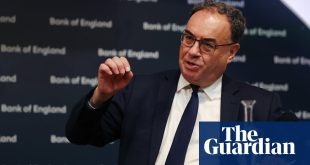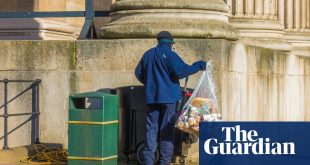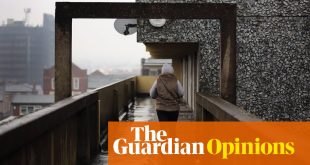The Treasury is pushing for most free Covid testing to end as soon as next month to save billions despite warnings from public health experts and scientists.
Several sources told the Guardian that Rishi Sunak’s department wants to end most PCR testing for people with Covid symptoms, possibly by the end of March. The exception would be those in hospitals, high-risk settings and for the 1.3m extremely vulnerable people who are eligible for antivirals if they contract Covid.
Under the plans, everyone else with symptoms would be either given some free lateral flow tests or no testing at all. A third option would be restricting the offer of lateral flows to symptomatic people over 50 and the clinically vulnerable. The advice for people without symptoms to take routine lateral flow tests is expected to be scrapped entirely.
In Europe, PCR tests can cost more than £30 each while some in the US are double that price. Rapid tests cost £5 to £10 in many countries.
It is understood the Treasury has been pushing for the lowest cost options of ending as much testing as possible amid concerns about the huge price tag for mass community testing, which has run into many billions throughout the pandemic.
However, the UK Health and Security Agency (UKHSA) has been urging caution within the government and has been pushing to keep existing testing arrangements in place until at least 1 April.
One source said the Treasury had even questioned at one point whether PCR testing was still necessary for the immunosuppressed, who are eligible for antivirals if they test positive, although this was denied by the government.
It comes after Boris Johnson announced plans this week for an end to mandatory isolation for those who test positive for Covid in England, as some Tory MPs push for him to declare the pandemic over and get on with “living with the virus”. At the time, he said free Covid testing would continue for now.
The changes are expected to be outlined in a document called Living Safely With Covid, which is due to be published on 21 February. One date mooted for the testing changes is 24 March, to coincide with what will be the two-year anniversary of the first lockdown.
A second source also said the government was planning to press ahead with removing almost all PCR testing, apart from for the 1.3 million most at risk, and move lateral flow tests mostly to a paid service. The testing regime is also likely to be moved to a home delivery service only, with walk-in centres closed across the country.
The health source said public health leaders were “blindsided” when briefed about some of the likely changes by the UKHSA chief executive, Jenny Harries. The dismantling of the testing system will mean many people will have no idea whether or not their symptoms are Covid.
In advice to government this week, Sage scientists said removing access to free testing would make it harder for people to take precautionary actions and increase anxiety among clinically vulnerable groups.
The scientists said the removal of free and accessible testing may be “taken as a signal” that they should continue to attend workplaces or social gatherings while showing Covid-19 symptoms, because these would become conflated with symptoms of other respiratory illnesses such as influenza.
There are also concerns among senior scientists leading the genomic surveillance effort in England that a drastic reduction in PCR testing will harm the effort to pick up on new variants.
Asked about the proposals to end most free community Covid testing, a government spokesperson said: “We will set out more detail in the plan for living with Covid, but there are no plans to stop free tests when regulations expire.” The date for the expiry of Covid isolation requirements has been brought forward by a month to late February.
Another government spokesperson from the Department of Health and Social Care said: “Everyone can continue to get free tests and we are continuing to encourage people to use rapid tests when they need them. Record numbers of tests are being delivered to pharmacies, homes and those who need them. Testing continues to play an important role in helping people live their day to day lives, keep businesses running and keep young people in school.”
At the same time, the government is understood to be considering whether to scale back, or even scrap, the UK’s “gold standard” Covid surveillance survey, run by the Office for National Statistics (ONS) and which is currently funded until April. It is understood that UKHSA has recommended to the government that the survey should continue for at least another year. A decision is expected in the coming days.
Prof Tim Peto, a professor of medicine at Oxford University who is involved in the ONS survey, said that as restrictions were stepped down surveillance was a crucial insurance policy, ensuring that threats from any future high risk variants would be promptly identified.
“How big a survey you need is a judgment call,” he said. “It’s a bit like deciding how many nuclear bunkers or flood defences you need.” Given that almost all domestic restrictions will be stood down at the end of February, Peto argued that the ONS survey should be maintained in its current form for at least six months. “After six months, if nothing awful has happened, you can take another look,” he said.
On the issue of surveillance for variants, a government spokesperson said: “The UK is committed to maintaining a world-leading surveillance capability as we track the development and impact of Covid-19, including potential new variants of concern.”
 Top Naija News – Nigeria News, Nigerian News & Top Stories Top Naija News – Nigerian Newspapers, Nigerian News. topnaijanews is a daily Nigerian newspaper covering Latest News, Breaking News, Entertainment, Sports, Lifestyle and Politics.
Top Naija News – Nigeria News, Nigerian News & Top Stories Top Naija News – Nigerian Newspapers, Nigerian News. topnaijanews is a daily Nigerian newspaper covering Latest News, Breaking News, Entertainment, Sports, Lifestyle and Politics.



